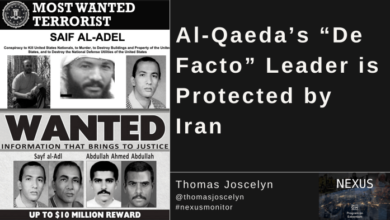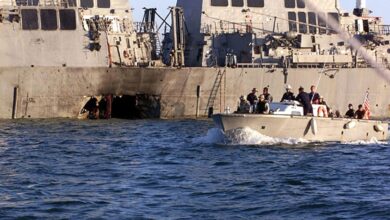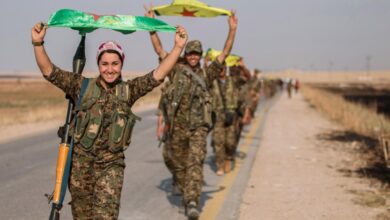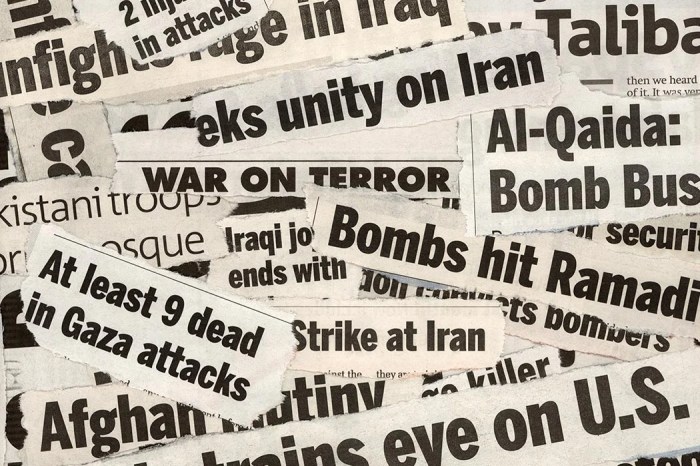
War on Terror Articles: Exploring a Complex History
War on Terror articles delve into the multifaceted history of this global phenomenon, exploring its origins, evolution, and lasting impact. The concept of a “War on Terror” emerged in the wake of the 9/11 attacks, transforming the geopolitical landscape and sparking a global debate on security, human rights, and the role of international cooperation.
This ongoing conflict has had profound implications for global security, politics, and the lives of ordinary people around the world.
From the initial response to the attacks to the ongoing fight against terrorism, these articles provide a comprehensive overview of the War on Terror, analyzing its historical context, global impact, legal and ethical considerations, military and intelligence operations, social and cultural impacts, economic consequences, and future challenges.
By examining the diverse perspectives and complexities surrounding this issue, these articles aim to shed light on the ongoing struggle against terrorism and its implications for the future.
Historical Context
The “War on Terror” is a term used to describe the global campaign launched by the United States government after the September 11, 2001 attacks. This campaign has been characterized by military interventions, counterterrorism measures, and a focus on combating extremist ideologies.
The concept of the War on Terror has evolved over time, encompassing a wide range of policies and actions.
Origins and Evolution
The term “War on Terror” was first used by President George W. Bush in the aftermath of the 9/11 attacks. He declared a “war on terrorism” on September 20, 2001, aiming to combat the threat posed by Al-Qaeda and other extremist groups.
This declaration was a response to the attacks, which were carried out by Al-Qaeda, a terrorist organization led by Osama bin Laden. The attacks targeted the World Trade Center in New York City and the Pentagon in Arlington, Virginia, killing nearly 3,000 people.The War on Terror has evolved since its inception, expanding beyond the initial focus on Al-Qaeda to include a broader range of threats, such as the Islamic State of Iraq and Syria (ISIS) and other extremist groups.
The scope of the campaign has also expanded geographically, with military interventions in countries like Afghanistan, Iraq, and Libya. The War on Terror has also been implemented through a range of counterterrorism measures, including surveillance programs, border security enhancements, and the use of drones.
Reading about the “war on terror” often feels like a tangled web of complex narratives and shifting justifications. It’s hard to ignore the unsettling parallels to the way tax avoidance and havens undermine democracy, creating a system where the powerful can operate outside the rules that bind the rest of us.
Ultimately, both issues expose the fragility of our systems and the need for greater transparency and accountability.
Key Events and Factors
The declaration of the War on Terror was influenced by several key events and factors, including:
- The September 11 attacks, which served as a catalyst for the campaign.
- The rise of Al-Qaeda and other extremist groups, which posed a growing threat to global security.
- The Cold War, which contributed to the proliferation of weapons and the development of extremist ideologies.
- The collapse of the Soviet Union, which created a vacuum in the Middle East and allowed extremist groups to gain influence.
Implementation in Different Countries
The War on Terror has been implemented in different ways in various countries. Some examples include:
- Afghanistan:The US-led invasion of Afghanistan in 2001 was a direct response to the 9/11 attacks. The goal was to overthrow the Taliban regime, which had provided safe haven to Al-Qaeda. The US military presence in Afghanistan continued for over 20 years, with the withdrawal of troops in 2021.
- Iraq:The US-led invasion of Iraq in 2003 was part of the War on Terror, although it was controversial and not directly related to the 9/11 attacks. The invasion was justified on the grounds that Iraq possessed weapons of mass destruction, which later proved to be false.
The US withdrew troops from Iraq in 2011, but returned in 2014 to combat the rise of ISIS.
- Pakistan:Pakistan has been a key ally in the War on Terror, but has also been criticized for its alleged support of extremist groups. The country has faced numerous terrorist attacks, including the 2008 Mumbai attacks.
- United Kingdom:The UK has been a close partner of the US in the War on Terror, participating in military interventions and implementing counterterrorism measures.
Global Impact
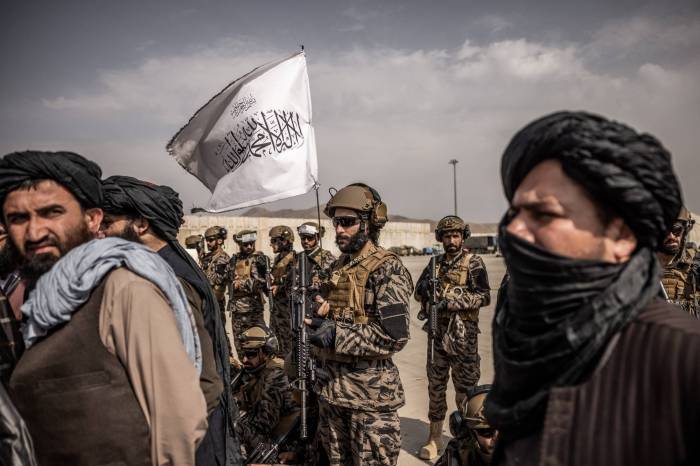
The War on Terror has had a profound and multifaceted impact on global security and politics. It has reshaped the geopolitical landscape, altered international relations, and influenced the development of security strategies worldwide. The war’s effects are far-reaching, impacting everything from counterterrorism policies to the rise of new security threats and the evolution of global governance.
The Rise of Terrorism and Its Impact on Different Regions
The War on Terror has been a significant factor in the rise of terrorism in different regions of the world. While terrorism existed before 9/11, the war’s response has inadvertently contributed to its spread and evolution.
- The Middle East and North Africa:The War on Terror’s military interventions in Afghanistan and Iraq, along with the subsequent destabilization of these regions, created a breeding ground for extremist groups like Al-Qaeda and ISIS. These groups exploited the power vacuum and widespread grievances to recruit fighters and carry out attacks.
- South Asia:The War on Terror has had a significant impact on South Asia, particularly Pakistan and India. The conflict in Afghanistan has spilled over into these countries, fueling sectarian tensions and providing opportunities for terrorist groups to operate. The rise of groups like Lashkar-e-Taiba and Jaish-e-Mohammed, who have carried out attacks in India, can be partly attributed to the war’s impact.
- Africa:The War on Terror has also contributed to the spread of terrorism in Africa, particularly in the Sahel region. The conflict in Mali and the rise of groups like Boko Haram in Nigeria are linked to the war’s destabilizing effects.
The proliferation of weapons and the influx of foreign fighters have exacerbated existing security challenges in the region.
Legal and Ethical Considerations: War On Terror Articles
The War on Terror has sparked intense debate about the legal and ethical implications of counterterrorism strategies. While the need to combat terrorism is undeniable, the methods employed raise concerns about their impact on human rights and the delicate balance between security and civil liberties.
This section delves into the legal frameworks and international agreements governing the War on Terror, examines the ethical implications of counterterrorism tactics, and explores the challenges of navigating this complex terrain.
Legal Frameworks and International Agreements
The War on Terror operates within a complex web of international law and domestic legal frameworks. While there is no single, universally accepted definition of terrorism, the United Nations (UN) has adopted several conventions aimed at combating it. The most significant of these include:
- The International Convention for the Suppression of the Financing of Terrorism (1999): This convention seeks to criminalize the financing of terrorist activities and requires states to cooperate in preventing and prosecuting such offenses.
- The International Convention for the Suppression of Acts of Nuclear Terrorism (2005): This convention criminalizes acts of nuclear terrorism and emphasizes the need for international cooperation in investigating and prosecuting such offenses.
- The UN Security Council Resolution 1373 (2001): This resolution calls on all UN member states to take measures to prevent and suppress terrorist acts, including by strengthening border controls, combating the financing of terrorism, and denying safe haven to terrorists.
War on terror articles often focus on the grand strategy, the big picture, but rarely delve into the nitty-gritty of how this “war” is actually fought. It’s a war that reaches the parts other empires could not reach, a war fought in the shadows, on the internet, and in the minds of individuals.
This makes understanding the nuances of these articles even more important, as they offer a glimpse into the evolving nature of conflict in the 21st century.
>Beyond these UN conventions, other international agreements and legal frameworks relevant to the War on Terror include:
- The Geneva Conventions: These conventions establish international standards for the treatment of prisoners of war, civilians, and the wounded during armed conflicts. Their application to the War on Terror has been debated, particularly in the context of detention and interrogation practices.
- The European Convention on Human Rights: This convention protects fundamental rights and freedoms, including the right to life, liberty, and security of person. Its application to counterterrorism measures has been challenged, raising questions about the balance between security and civil liberties.
Ethical Implications of Counterterrorism Strategies
Counterterrorism strategies often involve measures that raise ethical concerns. The use of targeted killings, drone strikes, and enhanced interrogation techniques has been criticized for its potential to violate human rights. These tactics raise fundamental questions about the limits of permissible force, the value of human life, and the potential for collateral damage.
- Targeted Killings: The practice of targeted killings, often carried out through drone strikes, raises concerns about the legality and morality of extrajudicial executions. Critics argue that such actions violate the right to due process and the presumption of innocence.
Reading about the “war on terror” often brings up questions about accountability and justice. How do we hold individuals responsible for crimes committed in the name of this global conflict? This is where the international criminal court introduction becomes relevant, as it aims to investigate and prosecute individuals for the most serious crimes of concern to the international community, including war crimes and crimes against humanity.
Understanding the ICC’s role is crucial for comprehending the legal framework surrounding the “war on terror” and the pursuit of justice in the face of such complex and often controversial events.
Defenders argue that targeted killings are necessary to prevent imminent threats and that they are conducted with a high degree of precision to minimize civilian casualties.
- Enhanced Interrogation Techniques: The use of enhanced interrogation techniques, including waterboarding and sleep deprivation, has been condemned as torture. Critics argue that such methods are ineffective in obtaining reliable intelligence and that they violate fundamental human rights. Defenders argue that these techniques can be necessary to extract critical information from high-value detainees and that they are used only as a last resort.
Balancing Security and Civil Liberties
The War on Terror presents a complex challenge for governments seeking to balance the need for security with the protection of civil liberties. Counterterrorism measures often involve restrictions on individual freedoms, such as surveillance, data retention, and travel restrictions. These measures can be effective in preventing terrorism, but they also raise concerns about government overreach and the erosion of privacy.
- Surveillance: The use of surveillance technologies, such as mass data collection and targeted monitoring, raises concerns about the potential for government overreach and the violation of privacy. Critics argue that such measures can be used to stifle dissent and target individuals based on their beliefs or associations.
Defenders argue that surveillance is necessary to prevent terrorism and that it is subject to legal safeguards to protect individual rights.
- Data Retention: The retention of personal data, such as communication records and internet browsing history, can be used to identify potential terrorists. However, it also raises concerns about the potential for misuse and the erosion of privacy. Critics argue that such data retention can be used to create profiles of individuals and to target them based on their activities or beliefs.
Defenders argue that data retention is necessary to prevent terrorism and that it is subject to legal safeguards to protect individual rights.
Military and Intelligence Operations
The War on Terror has been characterized by a wide range of military and intelligence operations, with a significant impact on global security. These operations have aimed to dismantle terrorist organizations, prevent future attacks, and protect national interests.
Military Operations
The War on Terror has witnessed numerous military operations, each with distinct objectives and strategies.
- The invasion of Afghanistan (2001):Following the 9/11 attacks, the US launched Operation Enduring Freedom, aimed at dismantling al-Qaeda and removing the Taliban regime, which had provided sanctuary to the terrorist group. The operation involved a large-scale military campaign, leading to the overthrow of the Taliban and the establishment of a new Afghan government.
- The invasion of Iraq (2003):The US-led invasion of Iraq, codenamed Operation Iraqi Freedom, was justified by the Bush administration as an effort to remove Saddam Hussein’s regime, which was accused of possessing weapons of mass destruction and supporting terrorism. The invasion resulted in the overthrow of Saddam Hussein and the establishment of a new Iraqi government.
However, the war led to a prolonged insurgency and a complex security situation in Iraq.
- Drone strikes:The use of unmanned aerial vehicles (UAVs) for targeted killings has become a prominent feature of the War on Terror. Drone strikes, often conducted by the US, have been employed against suspected terrorists in countries like Pakistan, Yemen, and Somalia.
These strikes have raised significant ethical and legal concerns, including civilian casualties and the lack of transparency.
- Special forces operations:Special forces units, such as the US Navy SEALs and the British SAS, have been deployed in various countries to conduct covert operations, capture high-value targets, and train local security forces. These operations have been crucial in disrupting terrorist networks and preventing attacks.
Intelligence Operations
Intelligence agencies play a crucial role in counterterrorism efforts by gathering information, analyzing threats, and providing actionable intelligence to policymakers and military commanders.
- Intelligence gathering:Intelligence agencies use a variety of methods to collect information, including human intelligence (HUMINT), signals intelligence (SIGINT), and open-source intelligence (OSINT). HUMINT involves recruiting informants and agents, while SIGINT involves intercepting communications and electronic signals. OSINT relies on publicly available information, such as news reports, social media, and government documents.
- Threat analysis:Intelligence agencies analyze the information they gather to identify potential threats, assess the capabilities and intentions of terrorist organizations, and predict future attacks. This analysis helps policymakers and military commanders make informed decisions about counterterrorism strategies and resource allocation.
- Counterterrorism operations:Intelligence agencies support counterterrorism operations by providing actionable intelligence, identifying targets, and facilitating the capture or neutralization of terrorists. They also play a role in disrupting terrorist networks and preventing attacks.
Effectiveness of Counterterrorism Strategies
The effectiveness of counterterrorism strategies is a complex and debated issue.
- Military operations:While military operations have been successful in removing terrorist leaders and disrupting terrorist networks, they have also contributed to the rise of new terrorist groups and instability in the affected regions. The effectiveness of military operations depends on the specific context, the objectives, and the long-term strategies.
- Intelligence operations:Intelligence operations have been crucial in identifying and preventing terrorist attacks, but they also face challenges, such as the difficulty of penetrating terrorist networks, the proliferation of information, and the evolving nature of terrorist threats.
- Alternative strategies:Alternative strategies, such as addressing root causes of terrorism, promoting economic development, and fostering interfaith dialogue, have also been proposed as essential components of a comprehensive counterterrorism approach. These strategies aim to address the underlying factors that contribute to the emergence and spread of terrorism.
Social and Cultural Impacts
The War on Terror has had profound and multifaceted social and cultural impacts, leaving an indelible mark on societies worldwide. These impacts range from heightened security measures and social anxieties to shifts in political discourse and the rise of Islamophobia.
The Role of Media and Propaganda in Shaping Public Perceptions of Terrorism, War on terror articles
The media plays a crucial role in shaping public perceptions of terrorism. The constant flow of news and images, often sensationalized and biased, can create a climate of fear and prejudice. This can lead to the demonization of entire groups of people and the justification of discriminatory policies.
“The media has a responsibility to report on terrorism in a balanced and objective manner, avoiding sensationalism and stereotypes.”
UNESCO
- The media’s portrayal of terrorism can influence public opinion and policy decisions. For instance, the media’s focus on certain types of terrorism, such as attacks on Western targets, can lead to the neglect of other forms of terrorism, such as state-sponsored terrorism.
- The use of propaganda by governments and terrorist groups can also shape public perceptions. Propaganda can be used to demonize opponents, justify violence, and manipulate public opinion.
- The rise of social media has further complicated the issue of media and propaganda. Social media platforms have become a powerful tool for the dissemination of information and misinformation, allowing terrorist groups to reach a wider audience and spread their message.
The Impact of the War on Terror on the Lives of Ordinary People
The War on Terror has had a profound impact on the lives of ordinary people, both in the West and in the Muslim world. The increased security measures, such as airport screenings and surveillance, have become a part of everyday life for many.
The fear of terrorism has also led to a rise in Islamophobia and discrimination against Muslims.
- The War on Terror has led to the displacement of millions of people, both within and outside of war zones. This has created a humanitarian crisis, with many refugees living in overcrowded and unsanitary conditions.
- The War on Terror has also had a significant impact on the economies of many countries. The costs of military operations, security measures, and humanitarian aid have strained government budgets.
- The War on Terror has also led to the erosion of civil liberties in many countries. Governments have used the threat of terrorism to justify increased surveillance, restrictions on free speech, and the suspension of due process.
Economic Consequences
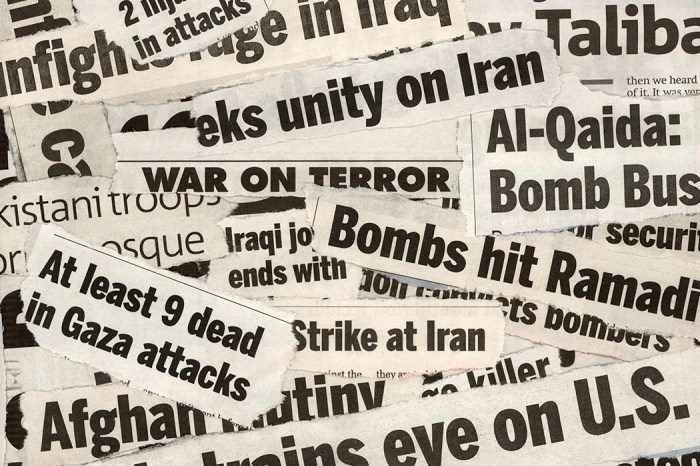
The War on Terror has had a profound and multifaceted impact on global economies, leaving behind a trail of both direct and indirect economic consequences. From the staggering costs of military operations to the disruption of global trade and investment, the economic implications of the War on Terror have been felt across the globe, shaping the economic landscape of nations and influencing international relations.
The Economic Costs of Military Operations
The War on Terror has been an expensive undertaking for the United States and its allies. The costs of military operations, including personnel, equipment, and infrastructure, have been substantial. The U.S. has spent trillions of dollars on the War on Terror since 2001, with estimates suggesting that the total cost could reach $8 trillion by 2023.
The economic burden of these expenditures has been significant, contributing to rising national debt and diverting resources from other critical areas.
The Impact of Terrorism on Global Trade and Investment
Terrorist attacks can have a devastating impact on global trade and investment. The uncertainty and fear generated by terrorism can lead to a decline in consumer spending, a decrease in business investment, and a disruption of supply chains. For example, the 9/11 attacks resulted in a sharp decline in air travel, leading to significant losses for the airline industry.
The 2008 Mumbai attacks had a similar impact on the Indian tourism industry.
The Role of Economic Sanctions in Counterterrorism Efforts
Economic sanctions have been a key tool in counterterrorism efforts. Sanctions can target individuals, organizations, and countries suspected of supporting terrorism. By restricting access to financial resources and trade, sanctions aim to weaken terrorist groups and limit their ability to operate.
For example, the United States has imposed economic sanctions on countries like Iran and North Korea, which are accused of supporting terrorist activities.
Future Challenges
The War on Terror, despite its long duration and evolving nature, continues to pose significant challenges. The changing global landscape, technological advancements, and the adaptable nature of terrorist organizations necessitate a forward-looking approach to counterterrorism. This section will explore emerging challenges, the impact of technology, and the evolving nature of terrorism, highlighting the need for adaptive and comprehensive strategies.
Technological Advancements and Terrorism
The rapid pace of technological advancements has both positive and negative implications for terrorism and counterterrorism. While technology can be used to disrupt terrorist networks and enhance intelligence gathering, it can also be exploited by terrorists to plan attacks, spread propaganda, and recruit new members.
- Cyber Warfare and Attacks:Terrorist groups increasingly use cyber warfare and attacks to disrupt critical infrastructure, spread disinformation, and incite violence. The 2017 NotPetya ransomware attack, attributed to Russian state-sponsored hackers, caused billions of dollars in damages globally. This example highlights the potential for cyberattacks to inflict significant economic and social harm.
- Social Media and Recruitment:Social media platforms provide terrorists with an efficient means to recruit, radicalize, and communicate with potential supporters. The Islamic State of Iraq and Syria (ISIS) has been particularly adept at using social media to spread propaganda, recruit fighters, and coordinate attacks.
This highlights the importance of countering online radicalization efforts.
- Artificial Intelligence and Automation:Advancements in artificial intelligence (AI) and automation raise concerns about their potential use by terrorist groups. AI-powered tools could be used to automate tasks such as target selection, propaganda generation, and even the development of autonomous weapons systems. This underscores the need for responsible development and regulation of AI technologies.



